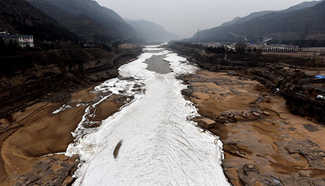CANBERRA, Jan. 6 (Xinhua) -- While the number of egg-related Salmonella cases tends to rise over the summer months in Australia, researchers concluded that hot weather does not result in a greater risk of contamination.
Research from the University of Adelaide further points to food preparation being a major factor in whether or not Salmonella manifests in food, and the production of eggs in hot weather did not have an impact on the number of cases of the bacterial infection.
Prof. Kapil Chousalkar from the university's School of Animal and Veterinary Sciences on Friday said while eggs were associated with an increased risk of consuming the bacteria, weather extremes do not play a role in whether or not an egg will be infected.
"Birds raised in the free range production system could potentially be exposed to weather extremes, and the free range environment is not as easily controlled as in cage egg production. Therefore, it has been assumed that hot weather has a role to play in the potential contamination of eggs at the site of free range egg production," Chousalkar said in a statement.
Chousalkar said more often than not it was overall food handling practices which had the biggest impact on whether or not the salmonella bacteria manifested in foods such as eggs.
"We found that there was no direct association between hot weather and increased prevalence of Salmonella at the production stage, even when data was collected in the hottest month of February," he said.
"Our results show that the types and levels of Salmonella found in and around free range egg farms is highly variable and often dependent on the specific management practices employed by each farm."
Chousalkar also renewed calls for a national standard of food safety to be implemented to further lower the risk of bacterial infections such as Salmonella in Australia.
"Currently, each of the states has their own food safety and surveillance programs. Because of its implications for public health, we believe the incidence of Salmonella contamination needs to be monitored in a standard way across all farms," he said.














